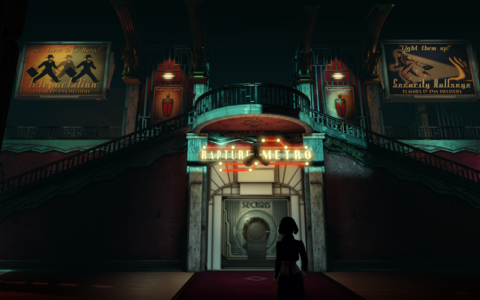Stepping Away From Irrational: Some Thoughts on Ken Levine's Departure
By thatpinguino 7 Comments
Spoiler Warning!! I am going to discuss the end of Bioshock Infinite in this post so steer clear if you don't want it spoiled.
A man is trapped in an endless cycle, running through seemingly infinite dimensions-- all the same yet different, all variations on the same unifying theme—without a clear end in sight… now am I talking about the protagonist of Bioshock Infinite or its creator? Ken Levine recently stepped away from Irrational Games and the Bioshock franchise after 17 years with the company and almost a decade on the franchise. Levine’s departure either precipitated or necessitated the dissolution of Irrational Games, and perhaps the Bioshock franchise as well. I have read plenty of negative sentiments on the internet towards Levine’s decision: why leave a large successful team? Why leave a franchise you spent so long building? How could you uproot so many developers for your own freedom? I don’t know exactly what happened to close Irrational Games and I don’t know exactly what drove Levine to leave, but I think that Levine’s decision makes some sense when framed against the ending of Bioshock Infinite, his last game at Irrational.

Infinite is a game with many faces; it is, at first glance, about a megalomaniac creating the most extreme example of an American “city on the hill.” Columbia is a microcosm and exaggeration of turn of the 20th century American politics and conflicts: racial strife and labor unrest simmers in Columbia’s backrooms and boilers while wealthy whites live in a self-righteous, Christian paradise. The original Bioshock (the last game in the series made by Irrational) was also, on the surface, a game about extremist ideologies and the people who extol them. Rapture was a flawed objectivist city under the sea created by the eccentric genius Andrew Ryan and brought down by its own excess and fundamental hypocrisies. Yet, the original Bioshock also had a meta-commentary about the nature of modern game playing. Through Andrew Ryan, Ken Levine and the developers of Bioshock were able to foreground how little agency modern videogames afford their players; in the words of Ryan, “A man chooses. A slave obeys.” I think that Infinite contains a similar meta-narrative; however, in this case I think Infinite is enumerating the issues with modern sequel driven game development, rather than linear game design.

One of the central themes of Bioshock Infinite is the never ending cycle: multiple universes with infinite slight variations, but whose beginning and end are fixed in place. The game’s ending goes to great lengths to show the infinite possibilities that Infinite’s story could have taken, yet there are three constants: “there is always a lighthouse. There is always a man. There is always a city.” In this one statement Elizabeth both connects Infinite with its predecessor and enumerates exactly what makes a Bioshock game a Bioshock game. There are infinite ways that these three conditions can be met and there are infinite lighthouses, men, and cities that could be created as the next entry in the series. So long as there is demand for more games, the cycles can theoretically continue forever with a new lighthouse, a new man, and a new city. In the modern sequel driven game industry, development studios can find themselves locked into their own cycles, making slight changes and iterating and iterating, always getting somewhere different, but never getting anywhere truly new. In Infinite, the only way to end the cycle is for Booker to end himself before the cycle can begin in the first place, and I think that Ken Levine’s choice to leave Irrational represents a similar form of escape.
In Levine’s farewell post he wrote, “Seventeen years is a long time to do any job, even the best one. And working with the incredible team at Irrational Games is indeed the best job I’ve ever had. While I’m deeply proud of what we’ve accomplished together, my passion has turned to making a different kind of game than we’ve done before. To meet the challenge ahead, I need to refocus my energy on a smaller team with a flatter structure and a more direct relationship with gamers. In many ways, it will be a return to how we started: a small team making games for the core gaming audience.” I think that in this move Levine is mimicking his latest protagonist; he is escaping the Bioshock development cycle by leaving the studio. He is leaving behind the known and venturing on to a new project with new goals. As a result, a studio that many people love is shuttering; Irrational closing is the end of one of the premier studios in game development and one of the strongest voices in the industry when it comes to narrative. However, I hope that Irrational’s ending also mirrors Infinite’s ending in that it opens up some new, potentially brighter future. The world of Infinite without Booker Dewitt/ Comstock might not be as exciting or grandiose, but at least it opens up the possibility of something new.
